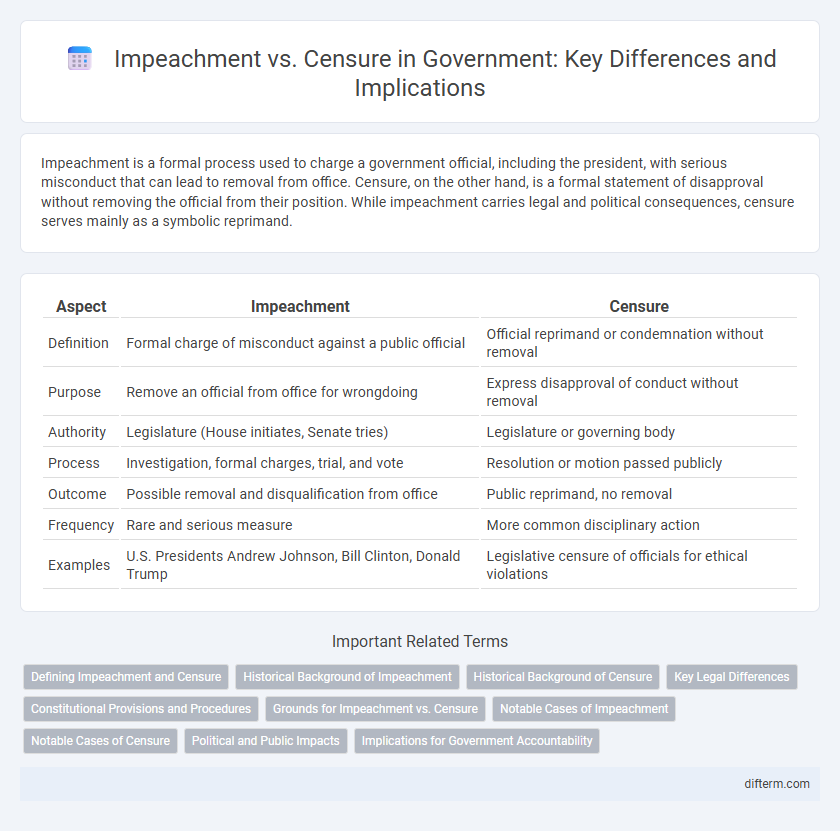Impeachment is a formal process used to charge a government official, including the president, with serious misconduct that can lead to removal from office. Censure, on the other hand, is a formal statement of disapproval without removing the official from their position. While impeachment carries legal and political consequences, censure serves mainly as a symbolic reprimand.
Table of Comparison
| Aspect | Impeachment | Censure |
|---|---|---|
| Definition | Formal charge of misconduct against a public official | Official reprimand or condemnation without removal |
| Purpose | Remove an official from office for wrongdoing | Express disapproval of conduct without removal |
| Authority | Legislature (House initiates, Senate tries) | Legislature or governing body |
| Process | Investigation, formal charges, trial, and vote | Resolution or motion passed publicly |
| Outcome | Possible removal and disqualification from office | Public reprimand, no removal |
| Frequency | Rare and serious measure | More common disciplinary action |
| Examples | U.S. Presidents Andrew Johnson, Bill Clinton, Donald Trump | Legislative censure of officials for ethical violations |
Defining Impeachment and Censure
Impeachment is a formal process by which a government official, including the president, is accused of misconduct or crimes warranting removal from office, typically initiated by the House of Representatives and followed by a Senate trial. Censure, on the other hand, is a formal expression of disapproval by a legislative body that does not remove the official but serves as a public reprimand. Both actions reflect mechanisms of legislative accountability but differ significantly in terms of severity and consequences.
Historical Background of Impeachment
Impeachment has its roots in English common law, evolving as a formal process in the U.S. Constitution to address serious misconduct by federal officials, including the President. The first U.S. impeachment occurred in 1797 with Senator William Blount, followed by notable cases like Andrew Johnson in 1868 and Bill Clinton in 1998, setting precedents for legal and political consequences. Unlike censure, impeachment carries potential removal from office, reflecting the gravity of charges such as "high crimes and misdemeanors" defined in Article II, Section 4 of the Constitution.
Historical Background of Censure
Censure has its roots in legislative traditions dating back to the early parliamentary systems in England during the 17th century, where it served as a formal expression of disapproval without removing officials from office. In the United States, censure gained prominence in the 19th century as Congress adopted it to publicly reprimand members for misconduct while preserving their position. Unlike impeachment, which involves formal charges and potential removal, censure functions as a symbolic rebuke that upholds accountability within government institutions.
Key Legal Differences
Impeachment involves a formal charge of misconduct that can lead to removal from office, requiring a legislative trial and a two-thirds majority vote in the Senate for conviction. Censure is a formal statement of disapproval against a government official without removing them from office, typically issued by a legislative body through a simple majority vote. The key legal difference lies in impeachment's potential consequence of removal versus censure's function as a reprimand without loss of official status.
Constitutional Provisions and Procedures
Impeachment is a constitutional process outlined in Article II, Section 4, and Article I, Sections 2 and 3 of the U.S. Constitution, allowing Congress to remove federal officials for "Treason, Bribery, or other high Crimes and Misdemeanors," involving a House majority vote to impeach and a two-thirds Senate vote to convict and remove. Censure, however, is a formal reprimand issued by Congress without constitutional mandate or removal power; it serves as a congressional expression of disapproval without legal consequences or alteration of the official's position. The impeachment process requires detailed constitutional procedures, including investigation, trial, and vote thresholds, while censure follows simpler, non-judicial congressional resolutions.
Grounds for Impeachment vs. Censure
Impeachment grounds typically involve serious offenses such as treason, bribery, or other high crimes and misdemeanors that threaten the integrity of government or constitutional order. Censure, in contrast, addresses less severe misconduct or ethical breaches that warrant formal disapproval without removal from office. While impeachment can lead to removal or disqualification from future office, censure serves as a public reprimand to hold officials accountable for misconduct.
Notable Cases of Impeachment
Notable cases of impeachment in U.S. history include Presidents Andrew Johnson, Bill Clinton, and Donald Trump, each facing charges in the House of Representatives with varying Senate trial outcomes. Impeachment involves formal charges and a trial, potentially leading to removal from office, whereas censure is a formal reprimand without removal. These cases highlight the constitutional mechanisms used to address alleged presidential misconduct at the highest government level.
Notable Cases of Censure
Notable cases of censure in government often involve high-ranking officials who faced formal disapproval without removal from office, such as Senator Joseph McCarthy in 1954 for his controversial anti-communist investigations. Censure serves as a public reprimand that holds officials accountable while preserving their position, contrasting sharply with impeachment, which involves a formal charge and potential removal. This distinction highlights censure's role as a disciplinary measure in legislative bodies to address misconduct without resorting to the more severe impeachment process.
Political and Public Impacts
Impeachment triggers a formal legal process that can lead to the removal of a public official, deeply influencing political stability and public trust in government institutions. Censure serves as a public reprimand without removing the individual from office, signaling political disapproval while maintaining the official's status and often causing less disruption. The choice between impeachment and censure significantly shapes electoral dynamics, media framing, and citizen engagement in democratic governance.
Implications for Government Accountability
Impeachment carries significant legal consequences, including potential removal from office, reinforcing checks and balances within government accountability structures. Censure serves as a formal reprimand, signaling disapproval without removing an official, thereby maintaining a balance between political expression and institutional integrity. Both mechanisms function as tools to uphold ethical governance and deter misconduct among public officials.
impeachment vs censure Infographic

 difterm.com
difterm.com